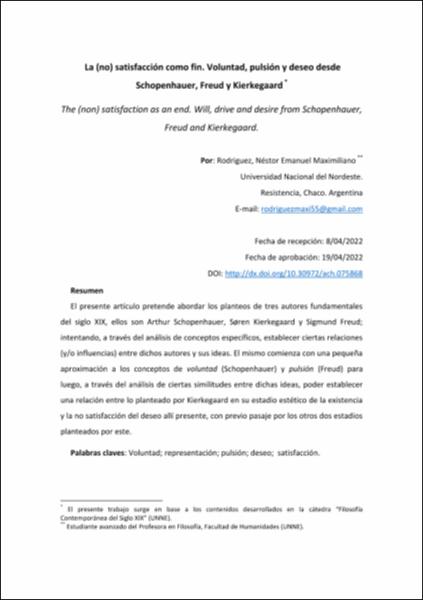Mostrar el registro sencillo del ítem
La (no) satisfacción como fin. Voluntad, pulsión y deseo desde Schopenhauer, Freud y Kierkegaard
The (non) satisfaction as an end. Will, drive and desire from Schopenhauer, Freud and Kierkegaard
| dc.contributor.author | Rodriguez, Néstor Emanuel Maximiliano | |
| dc.date.accessioned | 2023-03-31T17:17:55Z | |
| dc.date.available | 2023-03-31T17:17:55Z | |
| dc.date.issued | 2022-04 | |
| dc.identifier.citation | Rodriguez, Néstor Emanuel Maximiliano, 2022. La (no) satisfacción como fin. Voluntad, pulsión y deseo desde Schopenhauer, Freud y Kierkegaard. Acheronta. Revista de investigaciones en Filosofía. Resistencia : Universidad Nacional del Nordeste. Facultad de Humanidades, no. 7, p. 53-66. ISSN 2344-9934. DOI: http://dx.doi.org/10.30972/ach.075868 | es |
| dc.identifier.issn | 1850-3578 | es |
| dc.identifier.uri | http://repositorio.unne.edu.ar/handle/123456789/51256 | |
| dc.description.abstract | El presente artículo pretende abordar los planteos de tres autores fundamentales del siglo XIX, ellos son Arthur Schopenhauer, Søren Kierkegaard y Sigmund Freud; intentando, a través del análisis de conceptos específicos, establecer ciertas relaciones (y/o influencias) entre dichos autores y sus ideas. El mismo comienza con una pequeña aproximación a los conceptos de voluntad (Schopenhauer) y pulsión (Freud) para luego, a través del análisis de ciertas similitudes entre dichas ideas, poder establecer una relación entre lo planteado por Kierkegaard en su estadio estético de la existencia y la no satisfacción del deseo allí presente, con previo pasaje por los otros dos estadios planteados por este. | es |
| dc.description.abstract | This article aims to address the ideas of three fundamental authors of the nineteenth century : Arthur Schopenhauer, Søren Kierkegaard and Sigmund Freud; trying, through the analysis of specific concepts, to establish certain relationships (and/or influences) between the mentioned authors and their ideas. It begins with a brief approach to the concepts of will (Schopenhauer) and drive (Freud) and then, through the analysis of certain similarities between their ideas, to be able to establish a relationship with Kierkegaard´s esthetic stage of existence and the non-satisfaction of desire, with a previous passage through the other two stages proposed by him. | es |
| dc.format | application/pdf | es |
| dc.format.extent | p. 53-66 | es |
| dc.language.iso | spa | es |
| dc.publisher | Universidad Nacional del Nordeste. Facultad de Humanidades. Instituto de Filosofía | es |
| dc.relation.uri | http://dx.doi.org/10.30972/ach.075868 | es |
| dc.rights | openAccess | es |
| dc.rights.uri | http://creativecommons.org/licenses/by-nc-nd/2.5/ar/ | es |
| dc.source | Acheronta. Revista de investigaciones en Filosofía, 2022, no. 7, p. 53-66. | es |
| dc.subject | Voluntad | es |
| dc.subject | Representación | es |
| dc.subject | Pulsión | es |
| dc.subject | Will | es |
| dc.subject | Representation | es |
| dc.subject | Drive | es |
| dc.subject | Desire | es |
| dc.subject | Satisfaction | es |
| dc.title | La (no) satisfacción como fin. Voluntad, pulsión y deseo desde Schopenhauer, Freud y Kierkegaard | es |
| dc.title | The (non) satisfaction as an end. Will, drive and desire from Schopenhauer, Freud and Kierkegaard | es |
| dc.type | Artículo | es |
| unne.affiliation | Fil: Rodriguez, Néstor Emanuel Maximiliano. Universidad Nacional del Nordeste. Facultad de Humanidades; Argentina. | es |
| unne.journal.pais | Argentina | es |
| unne.journal.ciudad | Resistencia | es |
| unne.journal.number | 7 | es |
Ficheros en el ítem
Este ítem aparece en la(s) siguiente(s) colección(ones)
-
Artículos de revista [1103]





